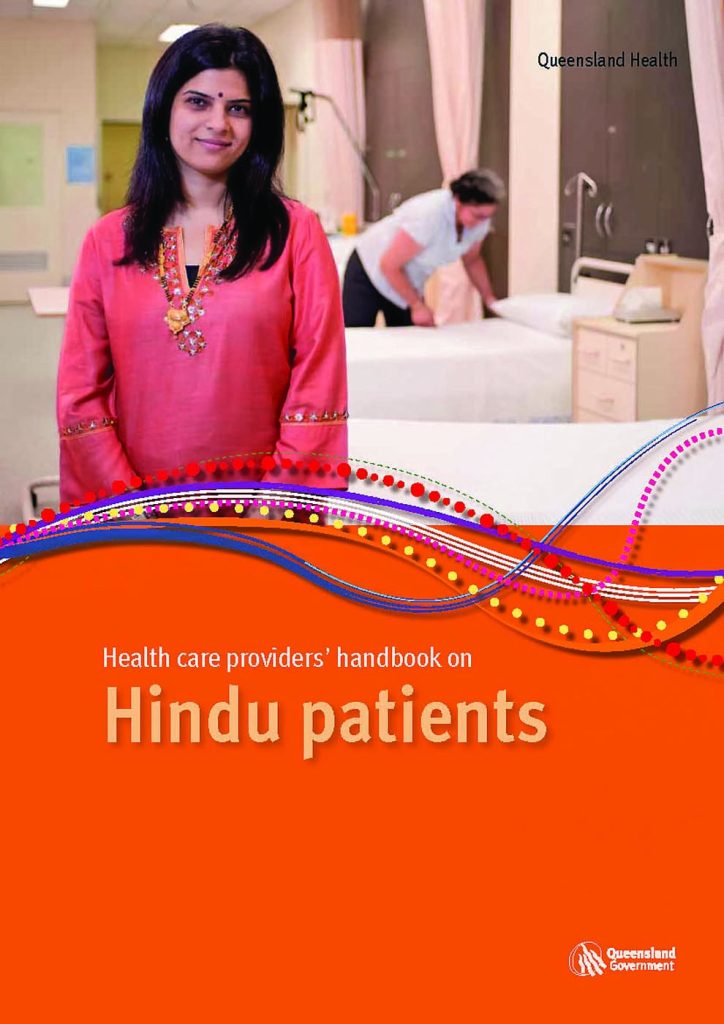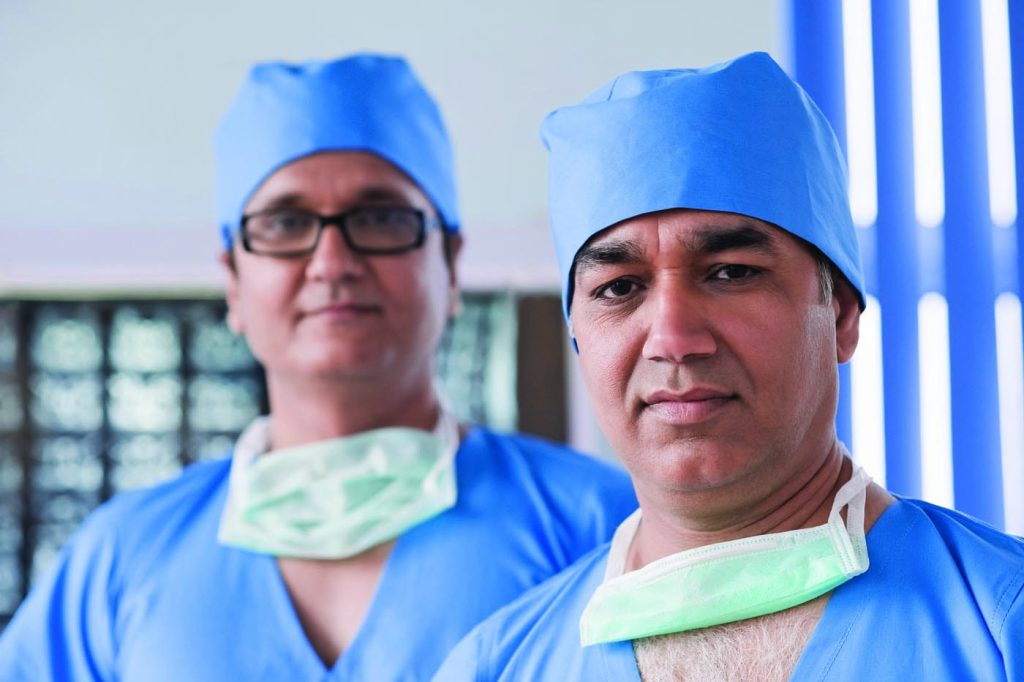EXCERPTS FROM A NEW BOOKLET BY QUEENSLAND HEALTH, AUSTRALIA
Photos: Dinodia
A SKILLED MEDICAL GROUP IN AUSTRALIA has produced an impressively accurate and comprehensive 24-page booklet that is packed with vital, insightful information for health care providers. Put together in 2011 by the Queensland Health Multicultural Services (multicultural@health.qld.gov.au [multicultural@health.qld.gov.au]), it is entitled Health Care Providers’ Handbook on Hindu Patients. The first half of the booklet, guidelines for health services, covers a wide gamut of subjects: including communication issues, religious observances, dietary needs, astrological beliefs, decision making, traditional medicines and remedies, medicines of animal origin, maternity services, home visits, rehabilitation and end of life issues. The second half is devoted to Hindu beliefs that relate to health care. It includes cogent sections on food, karma, holy days, fasting, abortion and more. The text as written is in a terse summary form meant for easy access by care givers and we share it unedited, believing that its sensitive wisdom will guide health-care providers all over the world looking after the needs of Hindu patients. On the advisory committee, ensuring depth and authenticity, was a host of persons of Indian origin: Shyam Das, Kermeen Kansara, Vinita Khushal, Balaji Motamarri, Rajni Nair, Pt. Sanat Pandey, Surendra Prasad, Sarva-Daman Singh and Krimesh Shukla.
Introduction
Queensland is a culturally and religiously diverse state—in 2006 nearly one in five Queenslanders (17.9 per cent) was born overseas, 7.8 per cent of the population spoke a language other than English at home, and more than 129,000 people followed a religion other than Christianity. Between 2001 and 2006, one of the fastest growing religions in Queensland was Hinduism. Figures from the 2006 census show there are more than 14,000 Hindus living in Queensland [total population 4.5 million]. This figure is now likely to be higher, as between 2007–08 and 2009–10, permanent migration to Australia from Southern Asia (which includes India, Sri Lanka, Bangladesh and Nepal) was second only to permanent migration from Europe. The increasing cultural, linguistic and religious diversity in the Queensland population means that to be safe, health services need to be culturally appropriate and responsive. Research indicates a strong link between low cultural competence and poor quality health outcomes, and significant risks.
Personal level of adherence
Hinduism is the world’s oldest living faith and third largest religion. It is practiced in many countries around the world, including by large populations in Southern and Southeast Asia, Europe, Africa, North America and Australia.

There is much diversity in the beliefs and practices of Hindus, with hundreds of diverse sects and no central doctrinal authority. As Hinduism grants individuals complete freedom to practice his or her religion as they choose, there are personal and cultural variations that make it difficult to provide definitive rules and regulations that apply to all Hindu patients. Because of these personal variations, it is important that health care providers consult the patient about their personal level of religious observance and practice.
However, Hindu patients should not be regarded as a “special” group that require additional attention from health care providers. Due to the common Hindu beliefs of karma (the belief that every action has a consequence which is experienced in this or future lives) and reincarnation, Hindu patients may display acceptance of difficult circumstances and be inclined to comply with the instructions of health care providers.
Section I: Religious Observance
Hinduism grants individuals complete freedom to practice his or her religion as they choose. As a result, it is important that health care providers discuss religious observance needs with each patient. Some topics that health care providers may wish to discuss with their patients include prayer and meditation, bathing and cleanliness, dietary needs and astrological beliefs.
Prayer and Meditation
* Prayer and meditation are important to many Hindus.
* There are no set times for prayers; however, most Hindus prefer to pray in the morning.
* Prayer can take place in any location, including in bed or in hospital prayer rooms.
* Hindu patients may wish to have religious statues or icons close by when in hospital.
Bathing and Cleanliness
* The concept of purity is important to Hindu life, and some Hindus may be quite meticulous about bathing and cleanliness.
* Most Hindus have a ritual of cleanliness and prayer each morning which includes brushing the teeth immediately upon waking, followed by bathing, prayer and then eating.
* A delay in eating to follow this ritual should not be interpreted as a refusal to eat.
* Washing of hands prior to eating is important as many Hindus eat with their hands.
* Washing with running water is important to Hindus and most will prefer a shower rather than a bath.
* Women may be considered impure or unclean when menstruating or following childbirth.
Dietary Needs
* Many Hindus are strict vegetarians, abstaining from all meat, fish and eggs. Vegetarian Hindus do consume dairy products.
* Hindus who choose to follow a vegetarian diet do so because of a belief in nonviolence which extends to animals, and a belief that nonvegetarian food impedes spiritual development.
* Some Hindus choose to eat meat and do not follow a vegetarian diet.
* Most nonvegetarian Hindus do not eat beef or pork, as cows are considered sacred and pigs are considered unclean.
* Many nonvegetarian Hindus may choose to abstain from eating meat on particular days of the week. For example, a strict vegetarian diet may be observed on Mondays.
* Some strict vegetarian Hindus will not eat from plates or use utensils that have previously been used to serve meat.
* Most Hindus will eat only with the right hand. Some may not eat food which has been passed to them with the left hand.
* Fasting is common for Hindus and can vary from complete abstinence to only avoiding certain types of foods.
* Fasting on a particular day of the week is also a common practice.
Astrological beliefs
* Many Hindus hold strong astrological beliefs and may believe the movement of the planets has a strong influence on health and wellbeing.
* Patients may wish to schedule appointments or surgeries according to these beliefs.
Decision-making
Hinduism views the needs of the individual in the greater context of family, culture and environment. As a result, family members, especially elders, can have a strong influence on decision-making related to health matters, including informed consent. Hindus may wish for family members to be responsible for making treatment decisions.
Administration of medicines
Traditional Medicines and Remedies
Hindus may use a variety of ayurvedic medicines, home remedies and spiritual remedies, often in conjunction with Australian medicine. It is important for health care providers to be aware of their patient’s preferences. Ayurveda is a holistic system of medicine practiced by many Hindus around the world. It is a highly valued and respected health science in India. Ayurveda is practiced by many Hindus in Australia, and ayurvedic medicines are regulated by the Therapeutic Goods Administration (TGA). As a discipline, ayurveda sits alongside Traditional Chinese Medicine in the TGA classification of complementary medicines.
Based on ayurvedic principles, Hindus believe that all illnesses, whether physical or mental, have a biological, psychological and spiritual element. Ayurveda seeks to maintain a balance between the body’s three elemental energies (humors). Good and bad health is related to the level of balance of these three energies. Many Hindus also use traditional home remedies which are based on ayurvedic medicine and are easily available from Indian grocery stores.
One of the most common Hindu spiritual remedies is vibhuti, or holy ash. Vibhuti is commonly used in Hindu religious worship and is believed to contain protective, purifying and healing properties when applied on the skin (particularly on the forehead), consumed in small quantities, or carried on the person in a small packet.
Medicines of Animal Origin
Some medicines may not be suitable for Hindu patients because they are derived from cows, pigs or other animals. The Queensland Health Guideline on Medicines/Pharmaceutical Products of Animal Origin states that health care providers should inform patients about the origins of their proposed medication if it is derived from animals and no suitable synthetic alternative exists. Patients should be encouraged to make informed decisions regarding their treatment.

Oral Hygiene
* Oral hygiene is very important to most Hindus, especially those who practice ayurvedic principles.
* Many Hindus prefer to brush their teeth immediately after waking in the morning and some may also scrape their tongue with a metal tongue scraper. This is done to avoid the ingestion of impurities that may have built up in the mouth during sleep.
* Hindu patients may also wish to brush their teeth immediately after waking from general anesthesia or surgery for the same reason.
* Health care providers should explain the benefits of also brushing the teeth after eating.
* Many Hindus use home remedies for oral hygiene and health purposes, including chewing mint leaves, cloves or fennel seeds.
* Oral health examinations and treatments are usually not regarded as invasive by Hindu patients.
Maternity Services
* A small number of Hindu ceremonies accompany pregnancy and childbirth.
* While most of these ceremonies are completed in private, there are some which may be completed while the mother and infant are in hospital care.
* After childbirth, a Hindu father may wish to perform the jatakarma ceremony to welcome the infant into the world. As part of the ceremony, the father touches and smells the infant and whispers mantras (religious verses) into the infant’s ears.
* Another rite which is performed shortly after birth involves drawing a small dot (often in the shape of an Om) behind the infant’s ear. The Om symbol may also be placed on a chain around the infant’s neck or placed in the cot.
* A family member may also wish to write the Om symbol on the infant’s tongue with jaggery (unrefined whole cane sugar) dipped in ghee or honey.
* Health care providers should advise parents that feeding honey to infants below the age of 12 months is not recommended in Australia due to the risk of infant botulism.
* The sixth day after birth is considered the most auspicious in a person’s life. On this day, a fragile white cotton thread is ceremoniously tied around the infant’s wrist, ankle or neck. A pen and blank piece of paper may also be placed in the infant’s cot, as it is believed that on this day Saraswati (Goddess of Learning) charts the child’s future.
* Some Hindus may wish to bury the umbilical cord on the sixth day after birth. If there are clinical reasons for not providing the umbilical cord to the parents, this should be explained.
* The naming ceremony (namakarana) usually occurs at the infant’s home after birth.
* Depending on family customs, the ceremony may be delayed if the infant requires extended hospital care.
* Some Hindu women may wish to express colostrum before feeding their baby for the first time.
* Health professionals should inform women of the benefits of feeding their infant colostrum.
Community health services

Home Visits
* Hindus may prefer for shoes to be removed when entering a home.
* If this is not possible for Workplace Health and Safety reasons, alternatives should be explored (e.g., wearing plastic shoe covers).
* Health care providers should avoid taking meat products into the homes of vegetarian Hindus.
Rehabilitation Issues
* Self care practices involving eating or drinking are ideally performed with the right hand.
* Health care providers should be aware that where a patient has lost the ability to use their right hand, sensitivity may be required.
* Similarly, loss of function in the left hand may affect the patient’s comfort with bathing and washing habits.
Visiting Arrangements
* Visiting the sick is an important responsibility for Hindus.
* Hindu patients may have large numbers of visitors, including those from outside their immediate family.
* Health care providers should discuss with the patient, or their family, the impact a large number of visitors may have on rest or care requirements, and other patients.
* Patients may wish for family members to stay in the hospital overnight. This should be accommodated if possible.
Care of Family and Older Persons
* Hinduism encourages family members to take a role in the care of family members.
* Hinduism especially emphasizes respect for all older people, with children having a special responsibility towards their parents.
* It is considered a family obligation to care for the elderly and the sick.
* Health care providers should take this into account when developing care plans or suggesting nursing or residential care.
End of life issues
* The sanctity of life is central to Hindu teachings.
* Hindus believe that all living beings possess a soul which passes through successive cycles of birth and rebirth.
* Hindu patients may wish to die at home, as this has particular religious significance.
* The patient’s eldest son is expected to be present before, during and after death, even if the son is a small child.
* Other family members may wish to be present and to participate in the care of the patient.
* Family members may request that patients not be told about a terminal diagnosis directly.
* A Hindu patient may wish for a pandit (priest) to be present to perform certain rituals, including: tying a sacred thread around the neck or wrist, placing a few drops of water from the River Ganges into the patient’s mouth, placing a sacred tulsi leaf (holy basil) in the patient’s mouth.
* A Hindu patient, especially a Hare Krishna follower, may wear sacred tulsi beads (a string of small wooden prayer beads) around their neck. It is important that these be on the body at the time of death.
* If it is necessary to remove these beads, they should be retied around the wrist (preferably right).
* Patients may wish to read or recite religious chants and prayers. However, some patients may prefer to listen on a personal media player or small radio.
* Hindu chaplaincy services are available in many Queensland Health facilities.
Deceased Patients
* A deceased Hindu’s body is usually washed by close family members, with the eldest son taking a leading role.
* The family may wish to light a small lamp or burn incense near the body.
* If possible, all jewelry, sacred threads and religious objects should be left in place.
* Health care providers should advise family members if it is necessary to remove these items.
* The deceased patient’s family may have a preference for the position of the body after death.
* Hindus are usually cremated as soon as possible after death.
Autopsy
* Hindus generally regard autopsies as unacceptable. However, autopsy is permitted if required under Queensland statutory laws .
* Hindus are usually cremated as soon as possible after death, and autopsy may affect this practice.
* Health care providers should consult with the family of a deceased Hindu patient before proceeding with an autopsy.
Section II: Hindu Beliefs Affecting Health Care
Food beliefs
Hindu dietary practices can vary depending on the individual’s beliefs and customs. Most Hindus do not eat beef or pork and many follow a vegetarian diet. Fasting is common among Hindus, but there are no set rules, and the decision to fast is up to the individual. Many Hindus follow ayurvedic dietary practices. Under this system, certain foods are classified as hot or cold and can adversely or positively affect health conditions and emotions. The classification of foods as hot or cold is unrelated to temperature. Hot foods are generally those foods which are salty, sour or high in animal protein, while cold foods are generally sweet or bitter. Some strict Hindus do not consume garlic or onion, as the properties of these foods disturb spiritual practices such as meditation.
Karma
* A central belief of Hinduism is the doctrine of karma, the law of cause and effect.
* Hindus believe that every thought, word and action accumulates karma, which can affect current and future lives.
* Hindus believe in reincarnation. Actions from a past life can affect events in the current life, including health and well-being.
* Health care providers should be aware that a strong belief in karma can affect decision-making regarding health care.

Holy days
Hindus do not observe a specific day of worship, although some days of the week may be associated with particular Deities. Hindus do observe a number of holy days and festivals which can have an impact on health care due to associated fasts. Most Hindu holy days are based on the lunar calendar, and the dates can vary from year to year. Some festivals can occur over an extended period, with celebrations lasting for days or weeks.
Fasting
Fasting is an integral part of Hinduism and is seen as a means of purifying the body and the soul, encouraging self-discipline and gaining emotional balance. Fasting may be practiced on specific days of the week, during festivals or on holy days, or in conjunction with special prayers. It is not considered obligatory for a Hindu patient to fast during hospitalization. However, some patients may wish to fast while in hospital. There is no specified way to fast, but individuals may choose to abstain completely from all food and drink or only abstain from certain foods.
Dress
While there is no religious requirement for modest dress, many Hindus choose to dress modestly and may be reluctant to be examined by health care providers of the opposite sex. Hindu women may wear a sacred thread or gold chain around their necks, and Hindu men and boys may wear a sacred thread across the chest. These items should not be removed during examination. If it is necessary to remove an item, permission should be sought prior to removal .
Hare Krishna followers, and some other Hindus, may wear sacred tulsi beads around the neck. If it is necessary to remove these beads, they should be retied around the wrist (preferably right). In addition, some jewelry worn by Hindus may have a sacred meaning, and patients should be consulted before removal.
Mental health and/or cognitive Dysfunction
Hindus believe that all illnesses, whether physical or mental, have a biological, psychological and spiritual element. Treatments which do not address all three causes may not be considered effective by a Hindu patient.
Many Hindus attach a stigma to mental illness and cognitive dysfunction. Many have a strong belief in the concept of the evil eye and may believe this to be a cause of mental illness. In addition, all illness, including mental illness, may be seen as the result of karma from this life or a previous life.
Transplants and Organ Donation
Hinduism supports the donation and transplantation of organs. The decision to donate or receive organs is left to the individual.
Contraception
There is no official Hindu position on contraception.

Abortion
Beliefs about abortion may vary depending on cultural or religious interpretations. Many Hindus believe that the moment of conception marks the rebirth of an individual, which may make abortion unacceptable, except in emergencies.
Assisted Reproductive Technologies
There is no official Hindu position on assisted reproductive technologies.
Pain Management
Hinduism encourages the acceptance of pain and suffering as part of the consequences of karma. It is not seen as a punishment, but as a natural consequence of past negative behavior and is often seen as an opportunity to progress spiritually. This may affect triaging or the monitoring of pain levels as Hindu patients may not be forthcoming about pain and may prefer to accept it as a means of progressing spiritually. However, this behavior may be less prevalent in Australia, especially among young people.
Death and Dying
Hindus believe that the time of death is determined by one’s destiny and accept death and illness as part of life. As a result, treatment is not required to be provided to a Hindu patient if it merely prolongs the final stages of a terminal illness. Under these circumstances, it is permitted to disconnect life supporting systems. However, suicide and euthanasia are forbidden in Hinduism.
Web Resources
The booklet, in its fullness (including a list of appropriate Hindu vegetarian foods at the back), can be seen here:
www.health.qld.gov.au/multicultural/health_workers/hbook-hindu.asp [http://www.health.qld.gov.au/multicultural/health_workers/hbook-hindu.asp]
A religious calendar that includes Hindu holy days may be found at:
www.health.qld.gov.au/multicultural/support_tools/mcsr.asp [http://www.health.qld.gov.au/multicultural/support_tools/mcsr.asp]
Health Care Providers’ Handbook on Hindu Patients is licensed under a Creative Commons Attribution, Non-Commercial, Share Alike 2.5 Australia licence. To view a copy of this license, visit:
www.creativecommons.org/licenses/by-nc-sa/2.5/au/deed.en [http://www.creativecommons.org/licenses/by-nc-sa/2.5/au/deed.en]
